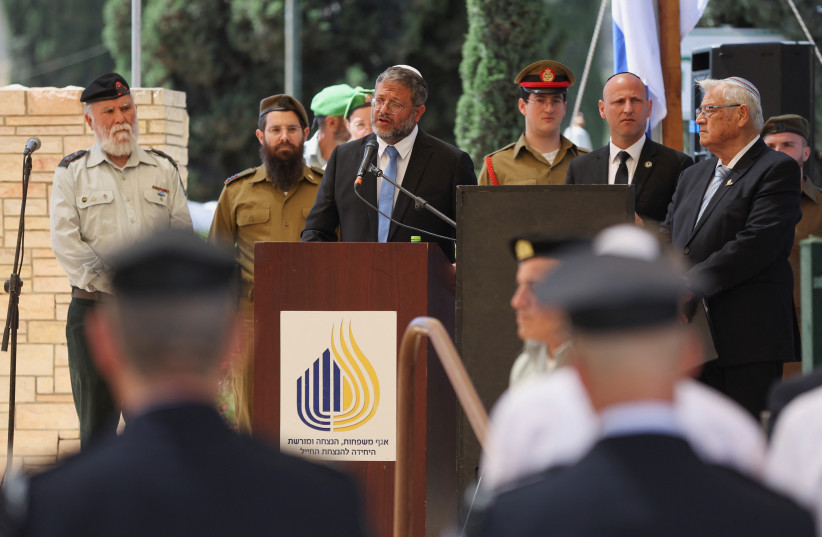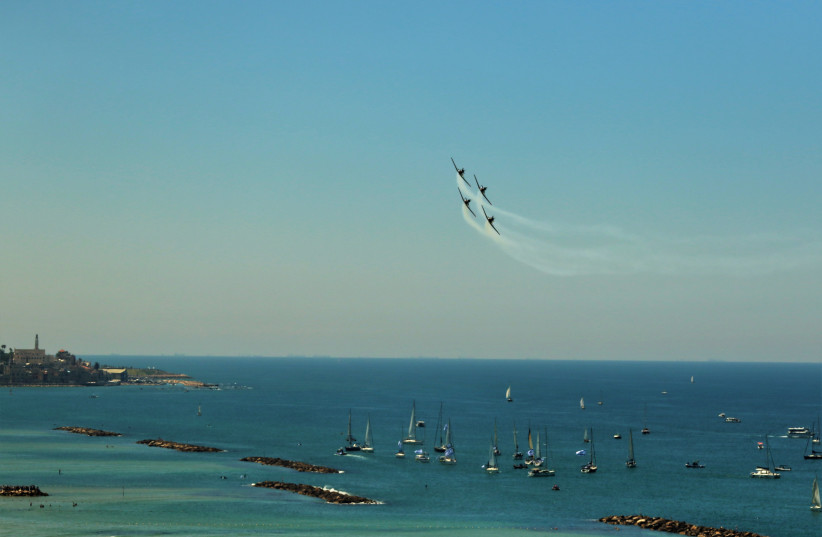I was one of millions of Israeli citizens who kept their fingers crossed that Remembrance Day for the fallen in Israel’s military campaigns and in acts of hostility and Israel’s Independence Day would go by without any major divergent events.
Though these days did not go by without any hitches, and I am sure that they were experienced differently by different groups within the political divide, on the whole, most of us were able to give a sigh of relief when they were over: the sky didn’t fall and (thank heavens) no one was killed or physically injured.
These days were, however, emotionally loaded against the background of the schism in Israeli society over the government’s policies in general and the legal reform/constitutional revolution, in particular.
On Remembrance Day, it was primarily the bereaved families among the opponents of the government’s policies who were emotionally on edge. The problem concerned the formal ceremonies in military cemeteries throughout the country. It is customary that the government sends its representatives to participate in these ceremonies and to speak on its behalf.
Reservations about ministers who didn't serve
This year, the opposition had deep reservations about some of the designated speakers, especially from among those who are the most avid supporters of the government’s current moves, but also from among the ultra-Orthodox ministers and deputy ministers who are doing their best these days to pass legislation that will exempt all ultra-Orthodox men from military service or any alternative national or civilian service.

There were also reservations about firebrands from among the extreme national religious parties, who either dodged full military service or were rejected for service by the armed forces because they had been actively involved in acts of terror and racism and convicted on charges of this nature.
The majority of government ministers – male and female – who fell under these categories stepped down of their own free will, not wanting to hurt the feelings of any bereaved families, even those considered foes, and should be thanked sincerely for their sensitivity.
However, there was a small minority, including National Security Minister Itamar Ben-Gvir, who was designated to appear in the military cemetery of Beersheba and refused to budge. The result was some ugly scenes in several cemeteries, but particularly in Beersheba, in which bereaved families clashed physically with each other.
A GROUP of Ben-Gvir supporters, of whom at least some arrived from outside Beersheba, acted aggressively and abusively against their leader’s opponents, while Ben-Gvir himself behaved as if he was at an election rally.
If the government was a little more sensitive and truly compassionate to all the bereaved families, it would simply have asked all its representatives at the memorial services to arrive at the cemeteries, lay wreaths and avoid delivering speeches if there was even minimal opposition to their speaking. It could also have been more sensitive in its distribution of ministers, deputy ministers and MKs in the various locations.
Independence Day was another story. While the government was primarily concerned with preventing the demonstrators against the legal reform to obstruct the official ceremony of the lighting of the torches on Mount Herzl, many of us who oppose the government were afraid that it would consciously or unconsciously exclude us from the official celebrations and leave us to feel like outsiders.
I must admit that in recent years I feel much less attached to this day than in the past. This might have to do with age. I nostalgically remember the proclamation of the state on May 14, 1948, and then the celebrations of Independence Day in the first decade after the establishment of the state, in Haifa, where I was born.
I remember singing and dancing in the company of my classmates in the Carmel Center and watching the municipal fireworks displays, from Yefe Nof Road overlooking Haifa Bay. I guess we were a very homogeneous, almost exclusively Ashkenazi population and had no or very little, contact with other sections of the population.
The new immigrants from Muslim countries lived down in a vast transition camp, Sha’ar Ha’aliya, on the outskirts of Haifa. We are now paying the price for that reality.
Today, in Jerusalem, I usually celebrate Independence Day by watching the ceremony on Mount Herzl the evening before on TV, though until the traditional fireworks were stopped last year out of consideration for veterans suffering from shell shock, I used to watch the display from my front porch.
Fighter jets and flowers
On the day itself, I usually go out for a walk with my camera to try to catch the areal display, as well as whatever wild flora I can find in my neighborhood. This year I treated myself to a short drive to Mount Shalmon, west of Ein Kerem, where two species of Ophrys (Dvoraniot) are in bloom.

Last year, when the “government of change” was still in power, for the first time in years I did get a feeling of togetherness from the torch-lighting ceremony, which managed – under the direction of then-culture and sports minister Chili Tropper – to keep politics out and to touch on various non-controversial phenomena and personalities.
This year, Prime Minister Benjamin Netanyahu and his wife Sara were back in the center of the frame (until recently, the ceremony belonged to the Knesset speaker). In addition, the running of the ceremony was returned to the hands of Transportation Minister Miri Regev, who stated on TV’s Channel 14 last Saturday night that she believes her choices represent the true Israeli DNA, but whose tastes in aesthetics and the desirable common denominator I, like many others, do not share.
THE CEREMONY was excessively noisy and I found the whole setting unpleasant to the eye. Someone should have paid more attention to the small details, such as the fact that the male presenter of the ceremony – Aki Avni – is significantly shorter than the female presenter – Moran Atias.
Besides, the artistic part of the ceremony was at times amateurish and was noticeably tilted in the Mizrahi direction. For example, the historical pieces were almost all related to Mizrahim.
True, in the past the artistic performances represented exclusively the secular Ashkenazi culture. But is the solution to push it all the way in the opposite direction?
In fact, this is also one of the problems with the government’s legal reform. No one denies that the legal system is unbalanced in favor of the secular, liberal, Ashkenazi direction and must be placed into better balance in order to regain the confidence and trust of the majority. Pushing the system all the way in the opposite direction will certainly not achieve the goal of balance.
Also, the choice of some of the torch lighters was odd, though there were also some good choices, such as the teenager Ofek Rishon, who had suffered from a long and painful boycott from her classmates in school and called out for a battle against this destructive phenomenon.
All in all, I didn’t feel at home in the ceremony, which did not reflect my Israel.
In the past week, Netanyahu has spoken a lot about the fact that we are one nation and brothers who share a single state. So why didn’t the ceremony reflect this message? Apparently, Netanyahu believes that Waze – which he reminded us in his short filmed message to the ceremony, is an Israeli invention – that will show us the way to unity.
The writer worked in the Knesset for many years as a researcher and has published extensively both journalistic and academic articles on current affairs and Israeli politics. Her most recent book, Israel’s Knesset Members – A Comparative Study of an Undefined Job, was published by Routledge, last year.
